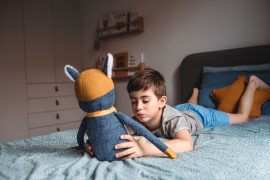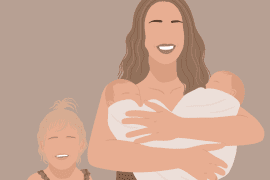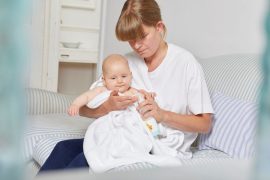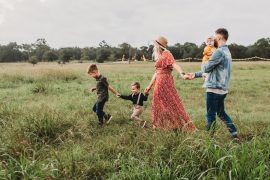Know that you aren’t always going to get it right!
One of the big elements of infant mental health is when a relationship can ‘rupture with repair’, so when it does go bad, take some time to repair it, and this will also teach resilience. Stress and difficult events are NORMAL, and terrible things will happen to the best, most functional families, but the way we manage and respond to stress, and whether or not it is ever addressed, can have a big impact on development.
Don’t jump in too soon.
It’s a balancing act. Resilience building means responding to your babies’ needs as separate to your own at times. So when they feel that they can explore, despite our own anxieties, it is sometimes better to let them give it a go, get a little dirty, even risk falling over, as this helps them to explore what they can and can’t do, and teaches them there is always someone there for them if they fail. We don’t want to give a ‘nervous’ message in our voice, facial expressions, and behaviours as they may learn that there is something to be afraid of a lot of the time – so keep it matter of fact and don’t over-reassure once they’re calm.
The baby flash cards can wait.
Don’t freak out about constantly stimulating and ‘teaching’ your baby everything early. Stare at them, touch them, smile at them, watch their little nuances, their little ticks and facial expressions. They are taking in so much about the world around them, and sometimes they need to be allowed to do that. Because the more in tune you are with them, the better you will be able to respond to them in synchrony, and give them what they need.
Don’t freak out about constantly stimulating and ‘teaching’ your baby everything early. Stare at them, touch them, smile at them, watch their little nuances, their little ticks and facial expressions.
Physical contact: Touch and cuddle your baby when they need it, skin to skin, hold them, WEAR THEM.
There is significant research demonstrating the incredible benefits of skin to skin contact on infant mental health and brain development. This continues past the newborn stage as well. Research also shows there is a 51% reduction in overall crying when a baby carrier is used. An added bonus is that if mum is experiencing mental health problems, the baby carrier provides a whole lot of relief. When crying is less, she feels a lot more confident and can respond well to babies’ cues when they are so close, as well as having her hands free to do whatever else she needs for herself. In fact, if we go back to Harlow’s studies, he concluded that the feeding experience strengthened the bond between carer and infant because of the intimate PHYSICAL contact it provided. Of course the milk is necessary, but the bond is indispensable.
So mummas, all you need to do for optimal infant mental health and an incredible foundation for life is keep meeting your babies’ needs! It sounds so simple doesn’t it – though we know it’s not always that straight forward and won’t always be that way – but in general, when you can – keep cuddling them, talking to them, singing, cooing and of course keep Kang-ing to their little hearts’ (and brains’) content!
“However we treat the child, the child will treat the world” ~ Pam Leo
*Disclaimer
If you are concerned about your own mental health, or if your baby has an ongoingly flat affect, or is continually inconsolable, please seek help from your General Practitioner doctor or paediatrician. There are many services available to support perinatal mental health. Parentline (1300 30 1300) is another service available along with your local health networks in Australia.
References:
ABC All In The Mind. (2015). Infant mental health. [podcast] Available at: http://www.abc.net.au/radionational/programs/allinthemind/mental-health-in-infancy/ [Accessed 12 Jun. 2018].
Dent, M. (2014). 9 Things: A back to basics guide to calm, common-sense parenting Birth-8. Murwillumbah, NSW : Pennington Publications.
Doidge, N. (2010). The brain that changes itself : stories of personal triumph from the frontiers of brain science. Carlton North, Vic. :Scribe Publications,
Feldman, R., Rosenthal, Z., & Eidelman, A. I. (2014) Maternal-preterm skin-to-skin contact enhances child physiologic organization and cognitive control across the first 10 years of life. Biological Psychiatry, 75 (1): 56
Harlow, H. F., ( 1958). The nature of love. American Psychologist 13: 673-685.
Harlow, H. F., ( 1959). Love in infant monkeys. Scientific American 200 (6): 68-74.
Hunziker, U., & Barr, R., (1986). Increased carrying reduces infant crying: a randomized controlled trial. Pediatrics, 77 (5): 641-8.
Plotsky, P, M., & Meaney, M. J., (1993). Early, postnatal experience altershypothalamic corticotropin-releasing factor (CRF) mRNA, median eminence CRF content and stress-induced release in adult rats. Brain Res. Mol. Brain Res. 18 (3): 195-200.
Tough, P. (2013). How Children Succeed: Grit, Curiosity and the Hidden Power of Character. Random House Publishers.
Van der kolk, B., (2014). The Body Keeps the Score: Mind brain body in the transformation of trauma. New York & London: Allen Lane, Penguin Lane.
Weaver, I. C., Cervoni, N., Champagne, F, A., D’Alessio, A. C., Sharma, S., Seckl, J. R., Dymov, S., Szyf, M., Meaney, M. J., (2004). Epigenetic programming by maternal behavior. Nat. Neurosci. 7 (8): 847-54.
Kangatraining provides Mums and Bubs with fun, safe, multi award-winning postnatal workout programs with over 100 trainers covering both regional and metropolitan areas across Australia & New Zealand. With Kangatraining you don´t have to wait till your baby is asleep or quiet before working out. Kangatraining means safe, overall fitness while your baby can relax and enjoy being close to you. Head to our website to put your suburb in and find the closest class to you. No classes near you? Join our team and become an instructor yourself! www.kangatraining.com.au.










